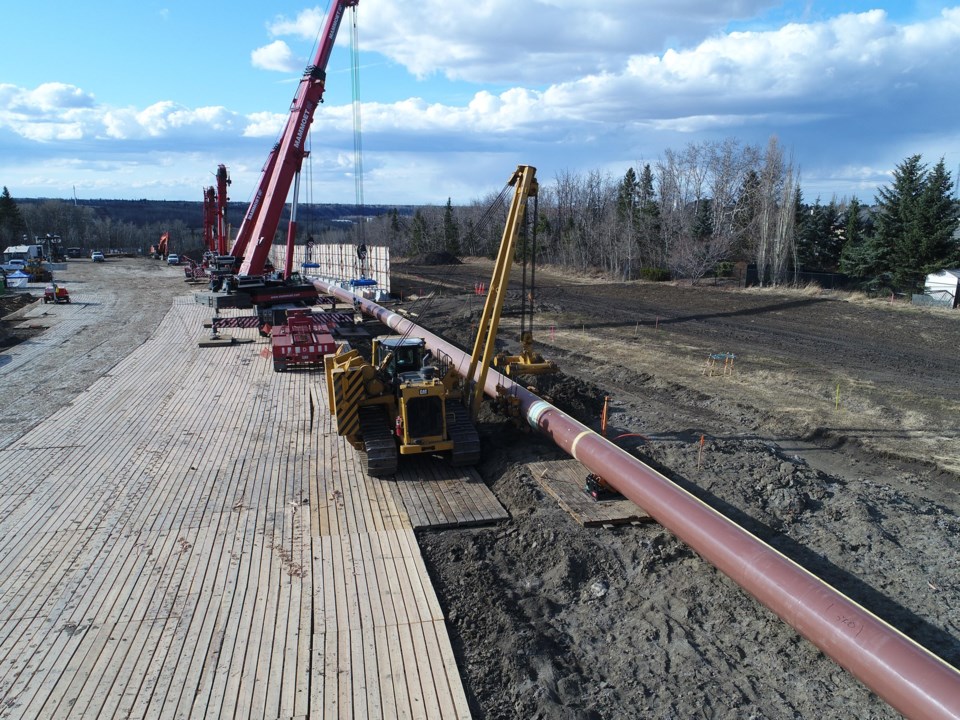In light of the Canadian federal government’s decision to not provide additional funding for the Trans Mountain Pipeline expansion project, the Tsleil-Waututh Nation Sacred Trust has called the viability of the pipeline a "delusion," and has reaffirmed its position that the project needs to be halted.
In a release on Feb. 22, the Trust said the expansion continues to infringe upon the rights, title, and interest of Tsleil-Waututh Nation.
“It will exacerbate climate change, critically threaten the Southern Resident Killer Whale population, and put at risk the ability for future generations of Tsleil-Waututh people to thrive.”
The announcement from the federal government comes after a construction cost update from Trans Mountain showed the estimated cost of the project now being $21.4 billion, a four-fold increase in cost since the project was purchased by Canada in 2018 for $4.5 billion.
Speaking to the North Shore News, Tsleil-Waututh Nation Coun. Charlene Aleck said the writing is on the wall. “The oil and gas industry is coming to a close.”
“They’re just fuddling around so much, that every time they push for another section of where they want to drill, or where they want to make a mess of the environment, it really drills home to us, as Indigenous land defenders and protectors, [it] just rings the alarm bells so loudly – what's at stake and what's important to protect,” she said.
“What they're doing is so backwards to what Tsleil-Waututh is doing, in trying to clean salmon bearing streams, cleaning clam garden beds, for the life and the ecosystem and all the habitats.”
Aleck said the Nation didn’t start the work of revitalizing habitats recently, it’s been ongoing work over generations of stewardship.
“Protecting the land and working in harmony with the land, sea, we've done this for generations, and generations, and generations, to a point where we could sustain our living here in one place, with the environment intact, with no animals going extinct, no ecosystem dying off, and no habitat being destroyed and obsolete to the territory,” she said.
Aleck said the work of Trans Mountain is in direct contradiction to the Nation's environmental work.
On Friday (Feb. 25), the beleaguered project was also dealt another blow, as the B.C. provincial government announced changes to the project's environmental certificate, which included a requirement that Trans Mountain provide research updates every five years on the behaviour of bitumen in the marine environment, identifying exposure pathways in the event of a marine spill, and identifying roles and responsibilities of local, provincial and federal authorities in the event of a marine spill, amongst others.
Aleck said the Nation has spent time and resources, and has sought out scientific professionals to write and research reports about the economic and environmental impacts.
“We've done all these reports, I think it's very intentional for them to not look at it … it’s almost on a slant where it's just a Native issue, a First Nations issue. And it's so easy just to box it up and put it on the shelf, rather than look at the whole social issue, environmental issue,” she said.
The Nation’s statement comes as the United Nations Intergovernmental Panel on Climate Change released its latest report, which states that “The world faces unavoidable multiple climate hazards over the next two decades with global warming of 1.5°C (2.7°F). Even temporarily exceeding this warming level will result in additional severe impacts, some of which will be irreversible. Risks for society will increase, including to infrastructure and low-lying coastal settlements.”
“This report is a dire warning about the consequences of inaction,” said Hoesung Lee, chair of the IPCC. “It shows that climate change is a grave and mounting threat to our well-being and a healthy planet. Our actions today will shape how people adapt and nature responds to increasing climate risks.”
Aleck said the oil and gas industry is a “sun setting industry” who want to make every “red cent” they can before it gets shut down.
“And they feel it. With the fires and heat domes, flooding, sea level rise, nature's just yelling at us,” she said. “And I don't know how [to] explain that, put exclamation marks around that, to say climate change is real.”
Aleck noted that the federal government’s decision not to provide additional funding to the expansion was the first time the government has publicly “blinked,” however she said she’s not getting her hopes up that the project will be scrapped altogether.
“For me, really, it's just another tactic. And it's just another day in my office at Sacred Trust,” she said. “Because they are [saying], ‘Look at this, and look at what we're doing at Westridge Marine,’ while the other hand is over here doing something else.
“I feel like it's another tactic and it's been a roller coaster ride.”
In a statement to the North Shore News, Trans Mountain said the business case supporting the expansion project "remains sound."
Highlighting the project's "significant benefits" to Canadian crude oil producers, the company said all Canadians will benefit from the extra access to alternative markets made accessible by Westridge Marine Terminal.
"Canada will benefit from the economic and tax contributions made by the project once it is in operation. Trans Mountain will pay billions in taxes and royalties to the federal and provincial governments through the construction and operation of the project over the next 20 years. In addition, Trans Mountain will make payments to British Columbia of between $25 million and $50 million annually, for a total contribution over a 20-year period of up to $1 billion," the company wrote.
The company said that due to the slow decline of Canadian oilsands-based crude oil production, Canada will be a net exporter of crude oil for "years to come."
"We have received the minister's decision and corresponding amendments to our Environmental Assessment Certificate (EAC) from the BC EAO and we are reviewing and determining next steps," TMX said.



